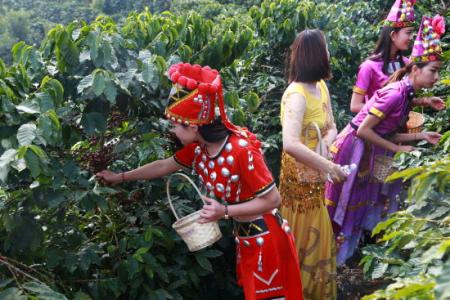There is an urgent need to "polish" the local brand consciousness of Yunnan coffee with a hundred-year history of ups and downs.
1970s
Farming system groping planting
The second phase, 1978-1988, was a period of ups and downs and exploration when most farming systems tried to plant.
Until the end of 1976, only the roadside of the Burma Road or the courtyard of the farmhouse could still see the shadow of coffee trees in Yunnan. Due to geographical reasons, the coffee saplings planted by missionaries have been sleeping quietly, waiting for someone to wake them up.
In 1988, in order to reduce the impact of coffee planting bases in South America on coffee prices, Nestle shifted its attention from Brazil, the world's largest coffee grower, to Pu 'er, the same latitude as Cuba, the home of coffee.
1980s
Foreign brands enter Yunnan
The third stage was from 1988 to 2008. After Nestle entered Pu 'er in 1988, Yunnan coffee entered a stable development stage, which lasted for 20 years.
Stimulated by multinational groups, Yunnan coffee cultivation has finally revived. Coupled with the gradual rise of China's urban middle class, coffee has become a new way of life for urban white-collar workers. More multinational groups, including Maxwell and Starbucks, have also come to Yunnan.
after 2008
Create and perfect industrial chain
The fourth stage is after 2008, from the first 30 years, relying solely on agricultural primary processing and planting exports to the stage of not only agricultural exports but also industry and brand compatibility, and constantly building and perfecting the industrial chain.
This stage is a stage full of opportunities and challenges, a stage in which coffee cultivation faces the transformation from traditional agriculture to modern agriculture, and a stage in which international trade expands and domestic potential market is tapped.
With the continuous maturity of domestic coffee market and domestic coffee industry chain, Yunnan coffee planting area and output are increasing constantly. At present, coffee planting in Yunnan Province has spread all over 35 counties and districts of 9 prefectures and cities such as Pu 'er City, Baoshan City, Dehong Prefecture, Lincang City, Wenshan Prefecture and Xishuangbanna.
By the beginning of 2016, China's coffee planting area exceeded 1.8 million mu, with a total output of 140,000 tons, accounting for 1.5% of the world's total output. Yunnan coffee planting area was 1.77 million mu, with a total output of 139,000 tons, accounting for more than 99% of the country. Yunnan local coffee enterprises, such as Hougu, Lingfeng, etc. ushered in spring.

Important Notice :
前街咖啡 FrontStreet Coffee has moved to new addredd:
FrontStreet Coffee Address: 315,Donghua East Road,GuangZhou
Tel:020 38364473
- Prev

China Coffee Industry Development report China is expected to become the world's largest coffee consumption market
Chen Zhenjia said in the release of "Coffee planting Distribution and advantageous Regional layout in China" that China's coffee producing areas are mainly distributed in Yunnan, Hainan, Sichuan, Taiwan and other regions. The tropical and subtropical mountain areas of southwestern Yunnan, northern Hainan and Tainan of Taiwan have better eco-environmental resources, which are very similar to the geographical environment and climatic conditions of Africa and Ethiopia, the origin of coffee.
- Next

Coffee consumption Culture-Why Starbucks can sell at high prices in China
The article holds that an important issue is culture. Since China opened its economy to the outside world and imported products from abroad in the late 1970s, these imports have gained some preference from image-conscious consumers. Wang Fei, a consultant in Washington, grew up in Wuhan. Traditionally, foreign products are thought to be better in workmanship, more tasteful and better, he said. People's society
Related
- What grade does Jamaica Blue Mountain No. 1 coffee belong to and how to drink it better? What is the highest grade of Blue Mountain coffee for coffee aristocrats?
- What are the flavor characteristics of the world-famous coffee Blue Mountain No. 1 Golden Mantelin? What are the characteristics of deep-roasted bitter coffee?
- Can I make coffee a second time in an Italian hand-brewed mocha pot? Why can't coffee be brewed several times like tea leaves?
- Hand-brewed coffee flows with a knife and a tornado. How to brew it? What is the proportion of grinding water and water temperature divided into?
- What is the difference between Indonesian Sumatra Mantinin coffee and gold Mantinin? How to distinguish between real and fake golden Mantelin coffee?
- What does bypass mean in coffee? Why can hand-brewed coffee and water make it better?
- Unexpected! Ruixing Telunsu lattes use a smoothie machine to foam milk?!
- % Arabia's first store in Henan opens into the village?! Netizen: Thought it was P's
- Does an authentic standard mocha coffee recipe use chocolate sauce or powder? Mocha Latte/Dirty Coffee/Salty Mocha Coffee Recipe Share!
- What is the difference between Vietnam egg coffee and Norway egg coffee? Hand-brewed single product coffee filter paper filter cloth filter flat solution!

